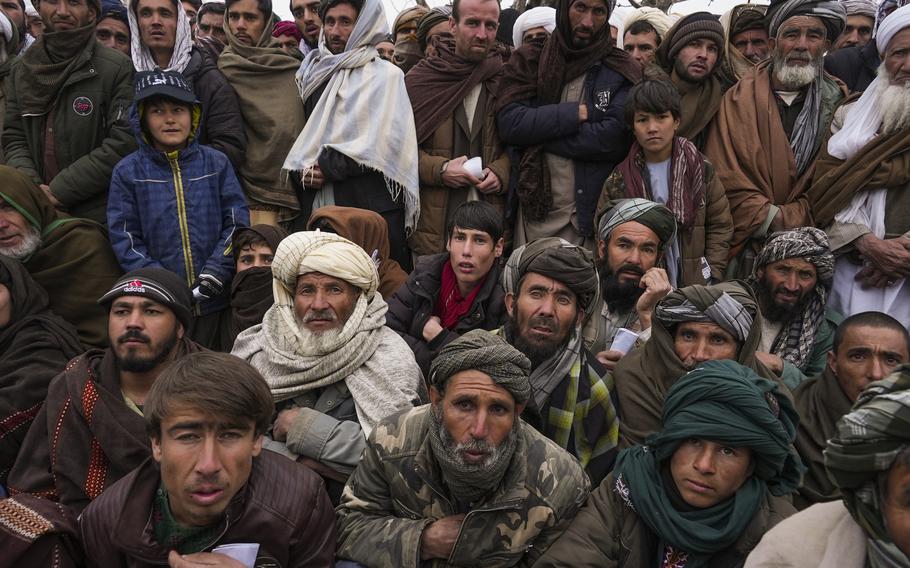
Hundreds of Afghan men gather to apply for the humanitarian aid in Qala-e-Naw, Afghanistan, Tuesday, Dec. 14, 2021. In a statement Tuesday, Jan. 11, 2022, the White House announced $308 million in additional humanitarian assistance for Afghanistan, offering new aid to the country as it edges toward a humanitarian crisis since the Taliban takeover nearly five months earlier. (Mstyslav Chernov/AP)
Stars and Stripes is making stories on the coronavirus pandemic available free of charge. See more stories here. Sign up for our daily coronavirus newsletter here. Please support our journalism with a subscription.
WASHINGTON — Calls are growing on Capitol Hill for the Biden administration to release some of the billions of dollars in seized Afghan financial assets the United States is keeping frozen.
The calls from dozens of Democrats, and at least one Republican, have become more urgent in recent weeks as worries deepen about the massive hunger crisis confronting Afghanistan’s citizens — as well as how a local Islamic State group might exploit the dwindling conditions to capture more territory in the troubled South Asian country.
When the Taliban seized power in August, the Biden administration responded by quickly taking control of the vast majority of the former Kabul central government’s foreign reserves — roughly $9.4 billion. The overwhelming amount of that sum were held in U.S. banks, including $7 billion kept at the Federal Reserve Bank of New York.
On Wednesday, more than 40 House lawmakers, led by Reps. Jason Crow, D-Colo., Tom Malinowski, D-N.J., and Peter Meijer, R-Mich., urged President Joe Biden to release a “substantial share” of the frozen reserves to relevant U.N. agencies. The group said those funds could be used to relieve some of the Afghan people’s suffering.
The lawmakers argued the worsening food crisis is a significant contributor to Afghanistan’s mass migration problems and is something that could be used by the local Islamic State affiliate, the Islamic State in Khorasan Province or ISKP, to destabilize the Taliban and seize more territory that could become a safe haven for terrorist groups.
“We have not just a moral obligation to help the Afghan people, but a national interest in preventing Afghanistan from once again becoming a safe haven for our enemies,” according to the letter. The group added, “We cannot allow Afghanistan to once again become a breeding ground for terrorist organizations intent on killing Americans and attacking our nation, but that dreadful scenario will be made more likely if we fail to address the heart-wrenching humanitarian situation unfolding there today.”
The letter also acknowledged that a portion of the frozen funds may need to be held back as part of an eventual payment to the families of some of the victims of the Sept. 11 terrorist attacks, who two decades ago won civil court judgments against the Taliban.
Cosigners of the letter included many of the House Democratic caucus’ national security leaders, including the chairmen of the Foreign Affairs, Armed Services and Intelligence committees.
The lawmakers want some of the frozen reserves to be funneled through U.N. agencies to pay the salaries of Afghan civil servants and teachers – an action that could help shore up public confidence in the new government and maybe even bring some much-needed stability to the Taliban-led ruling class.
The United Nations has warned that 1 million Afghan children are at risk of starving this winter and the U.N World Food Programme has warned that 95% of Afghan households do not currently have enough to eat.
One month ago, more than 40 House liberals, led by Progressive Caucus Chairwoman Pramila Jayapal, D-Wash., also sent a letter to Biden that called for the release of the frozen reserves on humanitarian grounds.
But Republicans are still mostly opposed to any release of the foreign reserves, arguing doing so would indirectly benefit the Taliban, who remain under U.S. sanctions.
“My view is that those funds were meant for a democratic government, not for a terrorist government and it’d be outrageous if they received the money,” House Foreign Affairs Middle East subcommittee ranking member Joe Wilson, R-S.C., said in a Thursday interview. “It would not go to the people; it would go to maintain the terrorists and the mass murder that is actually going on today.”
But Crow, a former Army Ranger who served two tours in Afghanistan, said he “couldn’t disagree more” with that argument.
“If you’re interested in preventing terrorism and instability, you want to prevent a famine and you want to prevent massive refugee movements, which are one of the greatest predictors of terrorism there is,” Crow said. “We want stability, we want to make sure we’re preventing starvation — and that’s also in the best interest of (U.S.) national security and preventing terrorism.”
Meanwhile, 18 senators — including one Republican, Sen. Jerry Moran of Kansas — wrote to Biden on Thursday to request he include “robust funding” for emergency international food aid in any additional supplemental funding request he might soon send to Congress.
“2020 and 2021 have seen the highest levels of hunger in more than ten years with the COVID-19 pandemic exacerbating conflict areas and severe droughts,” the senators wrote. “Nowhere are the humanitarian needs more acute than in Afghanistan, where freezing winter weather is only worsening acute hunger.”